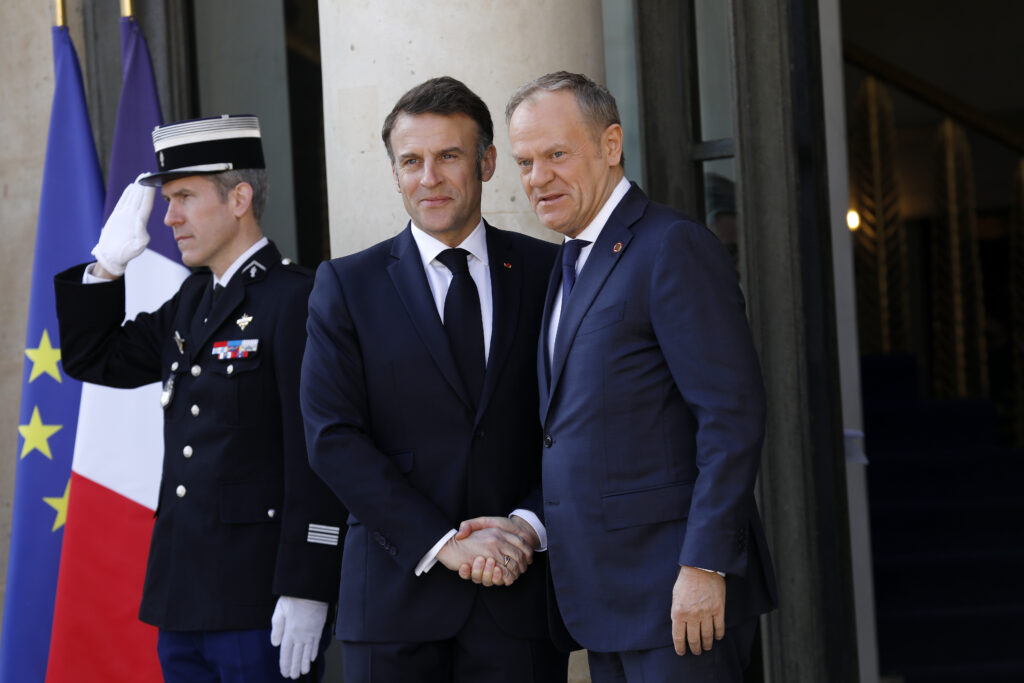Interviews / Europe, European Union, NATO
16 May 2025
Nancy Treaty: Towards a Strategic and Security Reinforcement of Franco-Polish Relations?

On 9 May 2025, Europe Day, French President Emmanuel Macron and Polish Prime Minister Donald Tusk signed a treaty in Nancy for enhanced cooperation and friendship between Poland and France. To what extent does this treaty formalise the consolidation of relations between Paris and Warsaw? In what context does it arise? What impact might it have on joint armament programmes and the development of a European Defence Technological and Industrial Base (DTIB)? Analysis with Louise Souverbie, researcher at IRIS.
How does this treaty mark a significant evolution in Franco-Polish bilateral relations, particularly in the field of defence? More broadly, to what extent can the Nancy Treaty be seen as an attempt at a multifaceted partnership beyond the military domain?
The signing of this treaty is part of the rapprochement between France and Poland in recent months — and even over the past two years — after a period of relative tension since 2015.
An initial treaty of friendship and solidarity was signed in 1991 and supplemented in 2008 by a Strategic Partnership — two documents of lesser scope and now outdated in view of the political and geopolitical realities of the continent and both countries. The early 2010s already saw a trend towards closer political ties, particularly from 2012 onwards, with regular exchanges between Presidents François Hollande and Bronisław Komorowski, as well as between Defence Ministers Jean-Yves Le Drian and Tomasz Siemoniak. At the same time, defence companies such as Airbus (then known as the European Aeronautic Defence and Space Company) sought to enter the Polish market — evidenced by the acquisition of Polish aircraft manufacturer PZL-Okęcie as early as 2001. Airbus Helicopters was to supply Poland with 50 Caracal helicopters under a contract worth over €3 billion, until Warsaw announced the termination of negotiations in 2016 following a change of government.
The return to power in 2015 of Jarosław Kaczyński’s eurosceptic Law and Justice (PiS) party marked a turning point in Franco-Polish relations, both politically and industrially. The “Caracal episode” not only led to legal action by Airbus before an international arbitration tribunal but also had major diplomatic repercussions. In parallel, Franco-Polish cooperation deteriorated at the European level, as Warsaw initially rejected the Franco-German initiative to launch Permanent Structured Cooperation (PESCO). In 2017, France consequently did not propose that Poland join the European Intervention Initiative. Furthermore, President Emmanuel Macron’s 2019 statement on NATO’s “brain death” was particularly poorly received in Poland and contributed to the deterioration of strategic relations and Poland’s reluctance to cooperate with France on defence matters.
A first rapprochement took place in 2020 with a joint declaration on European — including industrial — cooperation, followed in 2021 by a declaration of intent for cooperation in the space domain. The following year, Poland acquired two French observation satellites from Airbus Defence and Space. The Nancy Treaty indeed aims to continue this cooperation in space, which is mentioned several times as a priority area.
This cautious return to cooperation from 2020 onwards was nonetheless limited by political tensions and the divergent views of the two countries’ heads of state on key issues such as European defence, the transatlantic relationship, and attitudes towards Russia. Russia’s full-scale invasion of Ukraine in 2022, the defeat of PiS in the autumn 2023 legislative elections, and Donald Trump’s behaviour since his return to the White House in 2024 have all contributed to a progressive convergence of French and Polish positions on these matters, and to a fundamental improvement in bilateral relations at the highest level.
The treaty signed on 9 May in Nancy formalises this rapprochement. The document is comparable in scope and ambition to treaties signed by France with other strategic European partners: Germany (the Aachen Treaty, 2019), Italy (the Quirinal Treaty, 2021), and Spain (the Barcelona Treaty, 2023). The text establishes an annual bilateral summit chaired by the Polish Prime Minister and the French President, and aims to provide a framework for strengthening cooperation between the two countries in all areas: the European Union, foreign policy, security and defence, migration policy, justice and home affairs, industry and digital, sustainable development and environmental protection, infrastructure, energy, agriculture, research, culture, and education.
In what international context is the signing of the Nancy Treaty situated? What strategic concerns is this alliance addressing, and what solutions does it propose?
The rapprochement between Paris and Warsaw is undoubtedly linked to the upheaval in European security brought about by Russia’s war of aggression in Ukraine, combined with the increasingly real prospect of US disengagement from the continent. This dual threat has gradually aligned French and Polish strategic analyses and priorities. The recent rapprochement therefore results from a convergence of French and Polish interests. For Warsaw, the aim is to strengthen its weight within the European Union (EU) and the North Atlantic Treaty Organisation (NATO) by deepening bilateral partnerships with influential member states, and to diversify its security guarantees in response to increasing uncertainty surrounding US commitment. For Paris, this dynamic offers the opportunity to anchor its relations with Central and Eastern Europe, at a time when the continent’s strategic centre of gravity is shifting eastwards.
France has therefore sought to recalibrate its foreign policy towards the region and has adopted an increasingly firm stance on Russia, regaining credibility in Eastern capitals. The French President’s visit to Ukraine in summer 2022 and, especially, his speech at the Globsec Forum in Bratislava in 2023 received high visibility and were positively received in Poland. France is now seen more as a partner — even a potential security provider within the EU. Conversely, with Donald Trump’s re-election and under Donald Tusk’s pro-European leadership, Poland has made efforts since 2023 to revitalise its relations with European countries. Warsaw’s strategy of building international partnerships to guarantee its territorial security aims both to reinforce the US presence in European security — notably through the expansion of American military presence on its soil — and to develop stronger operational cooperation with its closest European partners.
The Nancy Treaty sets out a shared analysis of threats and recalls the European security architecture to which it belongs. These two foundations are laid out in the preamble, which underlines both “the persistent security threat posed by the Russian war of aggression against Ukraine” and “the role of NATO as the cornerstone of the collective defence of [Poland] and [France]”. The joint vision for European security is specified in the articles on EU cooperation (Article 2) and security and defence (Article 4). The two countries express their intention to strengthen European defence, which should be based on complementarity between the EU and NATO. The treaty adheres to the goal of reinforcing NATO’s so-called “European pillar” without going so far as to promote Europeanisation of the Alliance. Nonetheless, it stresses the need for Europe to take greater responsibility for its own defence and to develop autonomous operational capability. In terms of identified threats, the treaty highlights cyberattacks and disinformation campaigns.
The mutual security guarantees recalled in the treaty are thus embedded within NATO and the EU’s multilateral frameworks. Prime Minister Donald Tusk had stated shortly before the treaty was signed that its essence would be a mutual support clause in the event of aggression. While such a provision is indeed included in Article 4.2 of the document, it does not introduce a new guarantee as such, merely reiterating commitments made under Article 5 of the North Atlantic Treaty and Article 42(7) of the Treaty on European Union. It does, however, specify that mutual assistance may include “military means”. The security guarantees that France might offer Poland are not detailed in the treaty, which does not address the possibility of French troop deployment in Poland (although it does foresee joint missions and deployments), nor does it mention the complex issue of nuclear deterrence.
How far does military cooperation extend under this agreement between France and Poland? What implications might the treaty have for joint armament programmes and the development of a European Defence Technological and Industrial Base (DTIB)?
Despite the political rapprochement since 2023, no major armament contracts or joint cooperation projects between France and Poland have yet materialised. Thales is involved in the Polish frigate programme, supplying the combat management system and radars for three Polish-British-built ships. Safran has also entered the Polish market by supplying inertial navigation systems for air defence platforms and is continuing to develop cooperation with the Polish DTIB. These examples remain limited when compared to contracts concluded with US or South Korean industry.
The institutionalisation of the political and strategic rapprochement through the Nancy Treaty could now lay the groundwork for deeper cooperation in armaments. The treaty provides for strengthened cooperation in innovation and dual-use research and development (AI, quantum, space technologies, new energy sources, etc.) as well as in armaments through joint capability projects, though without specifying which. The Director General for Armaments, Emmanuel Chiva, already met in March this year with Polish Deputy Defence Minister Paweł Bejda to strengthen industrial and military cooperation between France and Poland, including a renewed offer from Naval Group for the Polish submarine programme. Airbus CEO Guillaume Faury has also held discussions with the Polish Defence Minister to boost cooperation, with Poland possibly taking a stake in the group and seeking to acquire in-flight refuelling capability. The realisation of these opportunities will depend on the ability of French companies to offer partnerships that sufficiently include the Polish industry.
At the European level, the Nancy Treaty demonstrates a convergence effort between France and Poland, who have managed to articulate a shared position despite occasionally diverging interests regarding the defence industry. Warsaw believes that the priority for European initiatives should be to rapidly strengthen the continent’s military capabilities, including through acquisitions and cooperation with third countries. Moreover, while Poland supports the strengthening of the European defence industry, it wishes to ensure that its own developing DTIB first has time to build capacity through technology transfers, as currently offered by countries such as South Korea. The Nancy Treaty therefore promotes the “progressive establishment of a European preference by acquiring defence equipment designed and produced by the European DTIB”, “compatible with the development of the Parties’ national defence acquisition programmes”. Reconciling the French and Polish visions of strengthening the European defence industry is ultimately a matter of timing. In the long term, both parties have an interest in reducing strategic dependencies and capability gaps through a more autonomous European DTIB able to “deliver equipment in the quantities and at the accelerated pace required”.
To implement the treaty’s orientations in defence and security, Paris and Warsaw plan to establish a cooperation programme. The effective implementation of the Nancy Treaty will depend on both parties’ ability to turn their political commitments into concrete and lasting cooperation.

